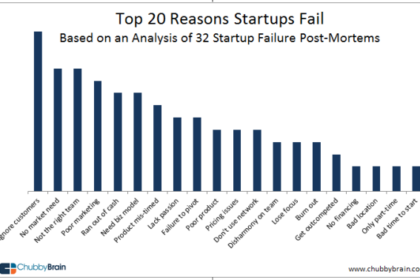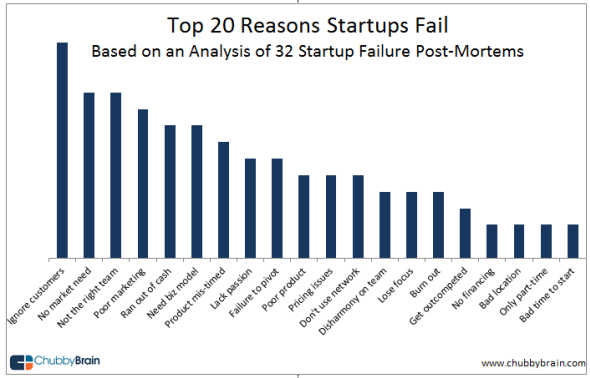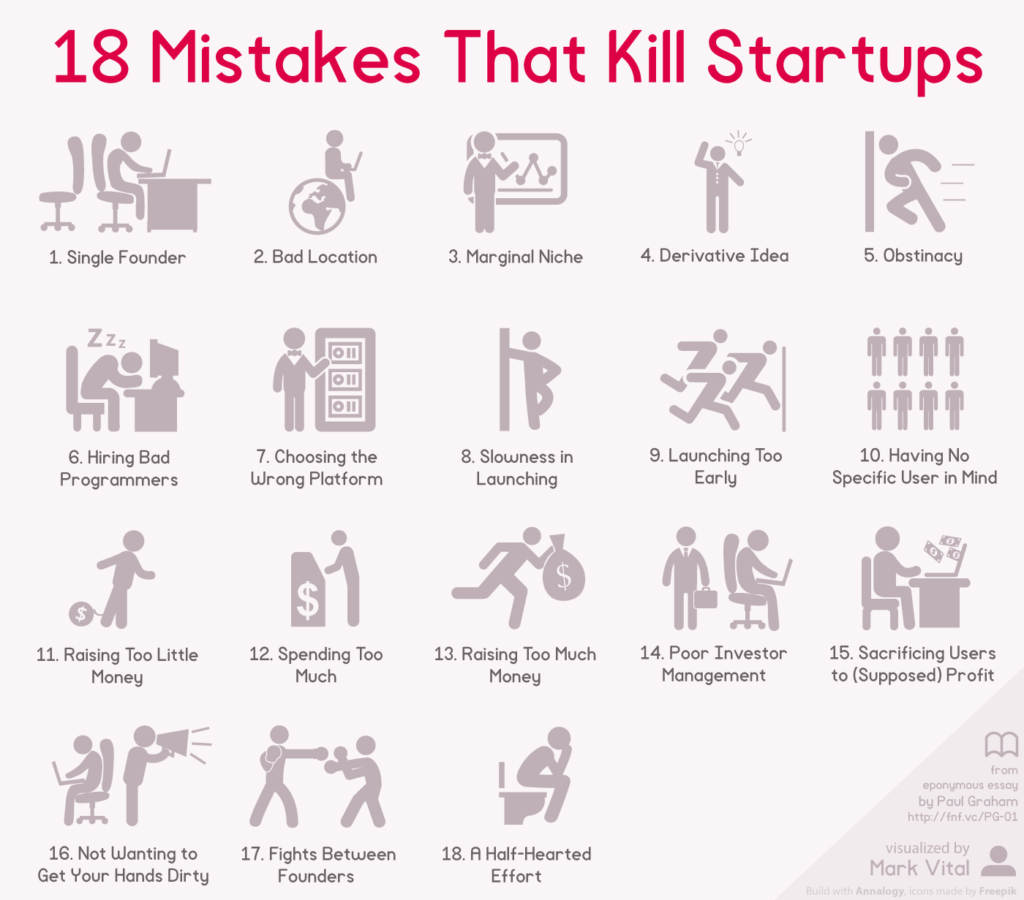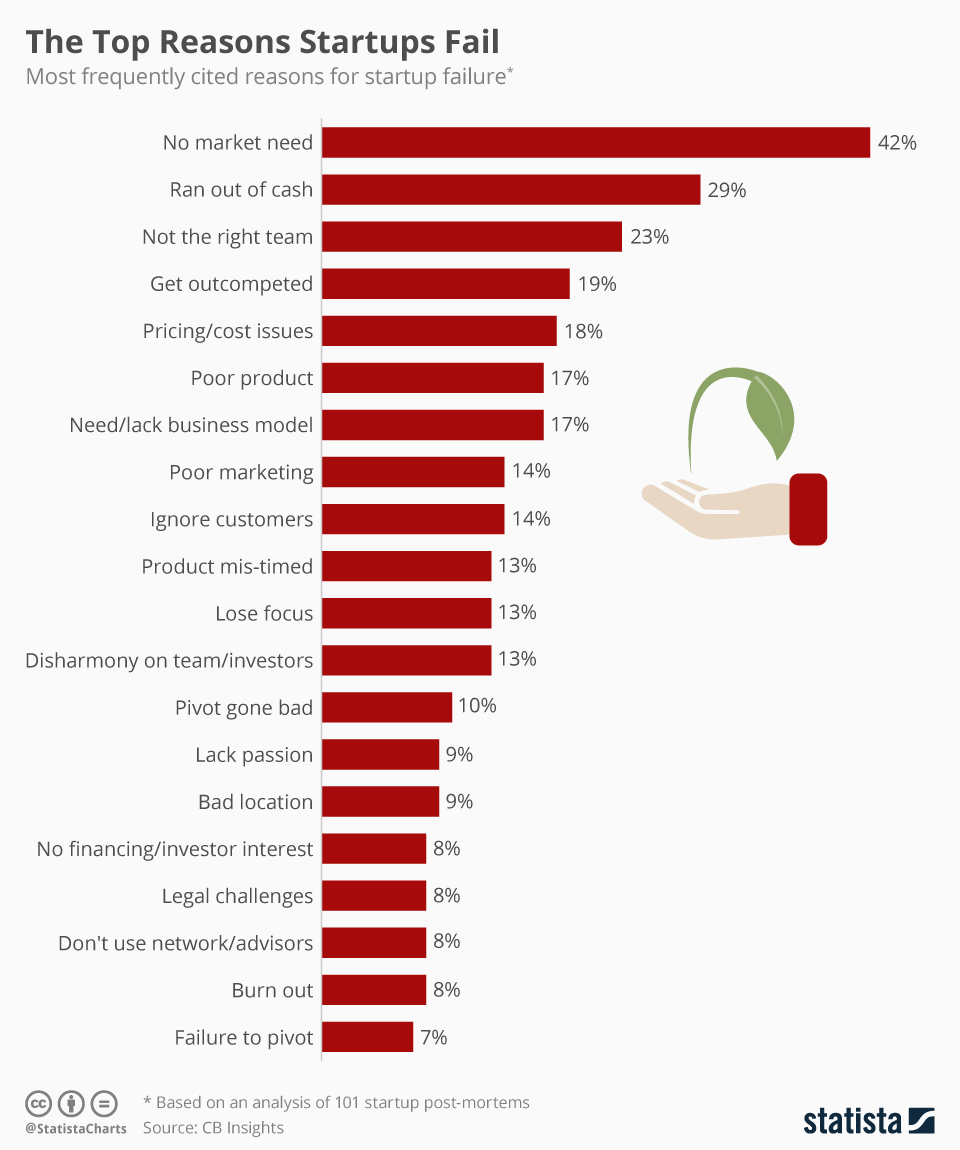
Article after article, study after study, offers Buzzfeed style insight to why startups fail. It’s such a popular and frequently recurring tweet that I’ve started chewing on WHY the question of why keeps coming up. As founders, perhaps we’re asking the wrong question and shouldn’t be seeking to know why but rather how (or, how come) so that we might avoid failure.
It’s Incubator launch season in Austin, TX so thanks to Mass Challenge, DivInc, and my work with Founder Institute, I’ve met and chatted with some 20 startup teams in the last 48 hours.
Now, odds are that you know by now that I’m an ardent proponent of data and search engines. With my past in Search, I always point out to founders that they shouldn’t think of Google as SEO; they should simply appreciate that when anyone hears of you or your startup for the first time, they’re going to look you up – are you there?
Not meeting someone actively seeking your business is as substantial a missed opportunity as not having Analytics in place. Why on earth would you start any business without measuring and knowing what’s going on??
I start most of my meetings with startups by asking to see their Web Analytics.
I get your pitch, it sounds neat, good luck! Show me your data (I can learn more about what’s going on in 3 minutes there than in an hour talking with you).
Many have nothing place. The majority haven’t set it up in any way that it’s meaningful.
“Okay… who’s in charge of developing your market?” I always ask next. “How do you know what you should be doing??”
The reply that ALWAYS makes my heart sink… “oh we’re testing some Facebook ads but we’re not ready to do any marketing.”
Not one of my recent 20 meetings had anyone experienced in charge of Marketing.
This recent experience reminded me of an analysis Chandni Shah Motwani did a few years ago for Chubby Brain.
It astounds me to no end that founders think marketing is what’s done to promote a business; that it’s only applicable when ready to sell to customers.
5 of the teams were doing Facebook ads and had no Analytics in place. WTF?! ? Someone help me grasp why we have so many companies doing this and who’s advising them so poorly?? Is it that founders don’t know what it means to be marketing? Is it that since they don’t know how to manage Facebook or AdWords, the last thing they should be doing is testing it through trial and error when hundreds of thousands of people do that stuff in their sleep? Are investors telling startups to fly blindly till they stumble into what works? Are we being advised these days to just build build build and customers will come??
Marketing. NOT Advertising and Promotion. Marketing.
How do Startups Fail? They don’t understand or are they aren’t prioritizing what Marketing actually is and should be doing.
Not sure what I mean by that, or don’t believe me?
Take a look at Paul Graham’s assessment.
#s – 2, 3, 4, 5, 7, 8, 9, 10, 11, 12, 13, 14, and 15 are all MARKET related issues. Marketing.
This is how startups fail!
Here’s the study Carnegie Mellon’s Chandni Motwani did for Chubby Brain

Reasons 1, 2, 4… Marketing.
And one could argue that since 1, 2, and 4 are Marketing related, #3 (not the right team) is in fact because that team didn’t prioritize, understand, or include Marketing.
Go down the list though, 1, 2, [3], 4, 5, 6, 7, 8, 9, 10, 11, 16, 17, and 20. Marketing.
20 of my most recent startup encounters have no one dealing with that.
Let’s do it again, here’s CB Insights with Statista
#1 No Market Need.
1, 2, 4, 5, 6, 7, 8 (actually says “poor marketing” LOL), 9, 10, 13, 15, 20
Now, let me do some big data, AI, analysis of those three perspectives. Let’s tease out the recurring themes in a rough rank order:
- No Market and Ignoring Customers – Paul Graham refers to it as Obstinancy; the market should be telling you want to do, not your blind certainty
- Wrong Team – What’s on your team?
- Bad Location / Wrong Platform – Developers will note that this is a decision of Node vs. Ruby and to an extent, it is. It’s also whether or not you should be based in Austin or Chicago, part of that Incubator, on iOS or Android, promoting on Facebook or Snapchat…
- Marginal Niche / Derivative Idea / Out competed – Do you know all of your competitors and partners?? Who’s job is it to know them?
- Slowness in Launching / Launching Too Early / Product Mis-Timed / Bad Time to Start – Is there any way to determine that other than studying the market? Is your launch AND roadmap attuned to what’s going on in the market?
- Having No Specific User in Mind
- Raising Too Little Money / Spending Too Much Money / Ran out of Cash – how do you think you determine the money it will take and from where that money will come?
- Pricing / Cost issues – How would you know?
- Don’t Use Network – which is what?
- Failed Pivot
- Hiring Bad Programmers
- Raising Too Much Money – Manageable by doing what?
- Poor Investor Management / Team/Investor disharmony
- Sacrificing Users to Profits
- Burn Out / Lose Focus / Half Hearted Effort /
Fights between Founders… which is motivated by what? - Not Wanting to Get Your Hands Dirty
- Legal Challenges
Granted, my ordering of a mashup of what’s in there but I think you might concur with the ranking and note that my questions are all associated with Market-based issues. That’s the work of Marketing.
Please appreciate that MOST people have no idea what marketing actually is and way too many advisors, incubators, and investors are guiding founders to think that marketing is what’s done to promote a product, when it’s ready. Let me bottom line something for you too – WAY too many “Marketers” have no idea what they’re doing and that’s not me picking on peers – that’s an issue with the way we’ve created job titles and roles in society. Someone who kicks ass at doing Facebook Ads is not doing Marketing – they’re doing online advertising. Someone who does “Content Marketing” isn’t really doing marketing, they’d developing content to promote something.
These mentality is f*-ing up the economy.
Promotion is one of the Ps of marketing and when you’re actually doing Marketing and not just Promotion, it includes all the other Ps in the foundation of the role: Pricing, Placement, Product, People, etc.
Founders that start anything without having first and foremost been marketing (studying the market, knowing competitors, uncovering from where funding might come), are shooting an arrow at a target while blind and drunk.
Marketing is the work of determining what to do, when, where, how, and for whom. BASED on the market.
A great economist once noted that, “Marketing is the work of making Sales superfluous.” Not irrelevant mind you! Just unnecessary. His point was that if you have to do Sales (to anyone: customers, partners, investors… are you having to seek out and push yourself into investors? that’s selling to them) then you Marketing hasn’t closed the gaps in the business to make that unnecessary.
CEO brings the vision, resources and team, and potential
CTO (or related role if not tech) delivers the solution
CMO studies and develops the market
No market = no business. No business, you fail.










Agree with your POV here, Pablo. Having been the “agency” and the in-house head of marketing for a mid-stroke startup or three, I can attest to inheriting poor branding, a tangled mess of media and content, and worse: no singular vision for the marketplace.
And, Facebook ads?
Communications strategy should be at the right arm of any person wishing to oversee a great business that has authentic and excited employee buy-in, fierce customer loyalty, internal and external champions…and moves together around priorities. Awareness and communications are everything.
I love your comment, Molly. Spot on.
I’m so looking forward to really catching up and getting to know your brilliance Molly. We need to do/know more about where we’re all heading!
Would love to finally sync up, Paul! I could say the same of you…I love reading your stuff! Let’s do some cool things.
As a start up, what do feel is the best way of developing an outsourced marketing team initially prior to financially bringing in a full time CMO?
NOT developing an outsourced team.
There’s a school of thought that tech oriented startups really can’t (shouldn’t) be outsourcing their dev to a 3rd party Why? Because you can’t really control & maintain what you don’t have the ability to do yourself.
Econ. P. Drucker noted years ago that only two things create value in business (for investors / as a startup): Innovation & Marketing.
Innovation is what creates competitive advantages and provides a value to new markets. But innovation WITHOUT a market is really just invention and inventions have no more value than ideas – founders waste money building things no one wants.
Because of that, Drucker went on to point out that Marketing is the distinguishing of the two. That Marketing’s job is everything that makes it unnecessary to do Sales (ergo, if you have to sell, you’re still missing something that Marketing should have figured out). Apple, Google, Salesforce, Tide… products/brands that don’t NEED to sell because they’ve done the marketing to know what to offer, at what price, how, when, where…
Marketing creates the customer and you can be a business that is NOT innovative but is exceptional at Marketing. You can’t be a business if you’re Innovative but have no market.
None of that answers your question….
How do you get this person on board? Same way you get an investor.
Source > pitch > give them equity for their investment > pay them below market > maybe they work 2-3 days instead of 5. BUT they are part of the team! Marketing MUST be paramount in a startup and it’s not for most…. this is why startups have a hard time convincing an experienced marketer to take a risk on a startup!
Think about it…
I need a 20 year experience Marketing exec in FoodTech. BUT, I didn’t bring them on from the get go. I don’t want to make it a priority. I expect of them only leads and sales.
The distinguishing thing that creates value in a business and the founders treat it as a necessary evil or cost center.
Your average Marketing Exec is going to look at you like every investor: ha, good luck!
I’ve joined (and exited) a number of startups that made this role the #3 in the company. Every one a success. Every market based decision (budget, product, pricing, investment, etc.) with that person making the majority of the decision because that decision is driven by the market, not the opinions and desires of founders. Every startup I’ve tried to help that relegates marketing to promotion has failed.
Curious what’s the difference between “No Financing” and “Ran out of cash”?
Good question. Cash flow is king, money in and money out. Running out of that – the ability to pay when it must – kills startups.
Financing is a form of capitalization. Debt. No financing refers to how many startups might need capital investment to supply demand, finish infrastructure, etc. Financing is what tends to always come before Funding (Investment) as Financing includes a bank loan, credit cards, etc. If you can’t get that when it’s needed, you’re probably done.
I appreciate your thoughtful response. I would like to catch up again soon to discuss further with you at your convenience. I will reach out privately.
“As a start up, what do feel is the best way of developing an outsourced marketing team initially prior to financially bringing in a full time CMO?” You shouldn’t have a startup without having a CMO on board. Marketing starts before the product is built – it informs what should be built, otherwise, why build something when you have no idea of demand for it?
There are a huge number of great ideas and concepts that have died a death because the F are so entranced with their product/concept that they get lost in the love for it, and lose the ability to market it to the great uninformed. I have run into this constantly in the Metals/Minerals sector, the bane of my life is Geos who are too in love with the science, and cannot sell the forward potential
Mark, what do you think is causing the economy to think that way? That’s the root of the question. To many of us, we can’t comprehend why anyone starts anything without doing marketing first and yet the counter point is just as strong that; that Product, the CEO, or CTO is in charge of figuring out what should be done and marketing comes in when ready to go.
Gary, too common in any industry. 🙁
FYI
Kristine Bryant
Naji H. Kelley
This is the problem https://COMMS.BAR was designed to fix. Let me know if any of the startups would benefit from the Lean Communications Framework Paul O’Brien
One of the main factors is arrogance, if I’m completely honest. Many products are built by genuinely brilliant people, who have a supreme confidence in what they build. They also believe they know best about everything, and often treat marketing and anything non-technical with disdain. They think that because they have built something brilliant that it should be a no-brainer to sell, and then get frustrated when they finally bring in a marketing function and the product they built isn’t flying off the shelves. The other side is that, and I’ve said this so many times on Linkedin that I’m in danger of becoming a meme, that most CEO’s don’t know what marketing actually is. They think they do, but actually, when you unpick it, they don’t actually understand it properly. Couple that with a CTO who thinks their product is genius and you have a recipe for disaster.
Their failure of branding and marketing is because they think Facebook and Google will do it for them. It does not work like that. Most CEOs think like a salesman and not like a marketer, thus they have no real idea how to build trust and a community.
“Most CEOs think like a salesman and not like a marketer, thus they have no real idea how to build trust and a community.”
Yes! Now, an interesting question in my mind… why?
I could argue that that’s not wrong. The CEO is in Sales?—?sell the company, the vision, to investors, to partners, to employees…
BUT what’s driving founders/CEOs to the push an emphasis on Sales while disregarding that Sales is a cost and not an investment? Disregarding that investing in Marketing endeavors to make Sales unnecessary?
There is something/someone driving more CEOs to do this.
So true. What’s your POV on how ecosystems can turn out more marketing-savvy founder teams who know how to position, message, measure, tell a story, etc??
Demand it. Frankly. These perspectives never occurred to me until I left Silicon Valley. You have a conversation with [the good] investors there and they look at you like you’re insane if you don’t have someone running The Market. Such founders are insane! We need to more diligently and publicly point that out.
P. Drucker (economist) noted in the 70s that only TWO things create value in business (everything else is a cost. Innovation and Marketing. He added that Marketing is the distinguishing of the two.
Why/How?
A business providing something that is NOT innovative can only succeed by knowing the marketing and providing it what it wants. Yes? Everything it does: supply, infrastructure, promotion, sales, accounting – those are all costs of DOING business and they’re only applicable if there IS business. Marketing is the work of creating a market and customer for the business so a typical business that is not innovative is only valuable through Marketing.
Flip side of that? An innovation that has no market? An innovative business or set of founders that can’t create a market or customer? All they have an invention. Inventions are just developed ideas. Ideas have no value.
So how does Innovation still create value when that invention still needs a market? Because Innovation is how we create NEW markets and customers. Innovation is the competitive advantage.
Innovation without Market = invention.
Market without Innovation = business.
Innovation AND Marketing = disruption.
The latter of those has the most value (and appeal to Investors).
Yet our startup communities today rarely point that out and demand it. We’re happy to celebrate a lean startup technology founder who is trying, with no regard at all for the fact that they aren’t doing anything to actually develop the market and create a business. We have to make it inexcusable – and should – because our economies WASTE time, money, and jobs supporting people who are starting things without doing any Market work. That waste is harmful to people; particularly when the alternative is so simple: dammit, get someone on the team that knows what they’re doing on the Market side!
Paul O’Brien I’m reading your comments and taking note. I believe you’ve hit the mark and I’m surprised that there’s not more discussion around this. Innovation births markets, sometimes even revolutions. For me it’s all about who thought of that and then who’s “backing” it, who’s on the team behind that idea turned business…?
Yep, I’ve worked for 16 startups, number one issue is entrepreneurs have a weak vision that gets attacked by consumers/clients when it’s pitched, and the entrepreneur doesn’t know what to do except ignore. I think it’s commonly believed by new leaders that “people” are hesitant/ignorant/stubborn with new products/services, but reality is those “hesitant people” should NOT include your customers. It’s ok if partners/investors/spouses/friends/family/vendors don’t get it, but not customers. Customers should get it more than you do, and your offering should be an expression of their voice.
For our part, ARwall, my current lean startup has not only a CMO, but also a Chief Creative who makes sure the product aesthetic is a market-fit, and a Chief of Product whose sole job is to convert client/customer feedback into actionables. Half the team is there to ensure product/market fit, that’s what it looks like to take it seriously IMHO.
Scott Van Valkenburgh, you are needed in Austin! We need to get you in touch with my associate Paul O’Brien and get these founders some help.
Some of us are already here in Austin! *waves*
Great points, Paul. Thanks for collecting and sharing this data.
I also think too many people feel equipped to do their own marketing—tactics—without understanding or even knowing what “marketing strategy” means.
MarTech is partially to blame, because there are 5,000 tools telling people they can DIY (see included link).
I’d love to chat with your 15 startups to see how my team can help. ?
Yep, we’re having the same chat about “Growth Hacking” being partially to blame over on the Facebook thread: https://www.facebook.com/groups/austinstartups/permalink/1880788911978556/?comment_id=1880872108636903&comment_tracking=%7B%22tn%22%3A%22R6%22%7D
Paul O’Brien If ever a term deserves to die, “growth hacking” certainly does. Growth for growth’s sake ignores LTV and brand. Both of which imperil the business.
Marissa Limsiaco Care to offer any input as to Tenavox’s POV to now? PSA -Tenavox is currently seeking stellar marketing support!
I can help Sabrina. Let’s talk.
we’ve got our strategy, analytics in place, and continuing to execute.. and thats where our focus is. Anyone interested in helping us amp up the marketing execution in an exciting and mindful environment, feel free to PM me!
Build – Measure – Learn, my friend.
Not Measure to know what to Build? -> Build -> Learn -> Optimize
Paul O’Brien I like that one.
I’m finding an expectation that most CEOs will be from a development background. As a marketer whose spent time learning development skills to fulfil his business ambitions, I see marketing as the primary skill for budding CEOs to be successful. Then again, I would say that!
You mean the products don’t market and sell themselves?
can I like this comment 100 times ?
In my experience Paul, as a Marketeer, people do not respect the function of marketing. They really think a cost that they can avoid or put off. Plus they think it’s all about party planning and fun. They miss the whole Marketing as a Science and discipline. When I was working in tech, they sent all the engineers to marketing when they had nothing else better for them to do.
I hear you, little experience in Marketing and Sales as well based on the one’s I met last night as MC.
Bit of where I’m coming from Michael Boyle, yes. Good seeing you there!
I’m reading a book about this that I highly recommend. Textbook-like meatiness, but a great read. https://smile.amazon.com/Founders-Dilemmas-Anticipating-Foundation-Entrepreneurship-ebook/dp/B007AIXKUM/ref=sr_1_1?ie=UTF8&qid=1522863806&sr=8-1&keywords=the+founders+dilemma
Ridiculous
Doesn’t “not the right team” encompass all the other reasons?
Or are the other reasons correlated with why it’s not the right team Michael?
So glad you wrote this however I fear it will fall flat. I believe many lemmings see D2C brands taking on incumbents with legacy channels and models and feel the team should be similarly from scratch. This is a mistake that piles of capital raised can kick down the road yet never solve.
So true and huge insight for any startup
Oh rest assured LOL, it’s getting lost on many. Disturbingly too many who are arguing with me about what Marketing is.
Easily 20% of the comments here (and on Facebook) are that investors are telling founders, or founders don’t understand why, they’d spend money on promoting a product that isn’t ready!
It’s as though people aren’t even looking at the studies or reading about what Marketing should actually be doing.
Fully understanding the market and the unmet needs of the customers that a startup MVP is trying to address is critical even in the Concept stage of startup. However, there are many other pitfalls that a startup can fall into as they evolve from Concept through Exit. This is why experienced advisors and proven methods are needed to greatly increase the probability of success for all businesses, especially startups. Proxcent Transformations can help in all stages and even beyond Exit. Learn more about the Nature of Business at https://proxcent.com/nature/
Hazard a guess for me — what percentage of the founders you met in the last 24 hours have primarily development/engineering backgrounds?
eh… yes… healthtech, social impact business founders. Probably on the whole, more engineers, yes. But not entirely
Amen. #1 is caused by #4.
Ultimately all start ups fail because they run out of money… Every other problem can be solved by more money, as it can give you enough runway to find the path to success. And the path to success is often a winding road.
Yes… though money comes from the market. Be that from customers, investors, or banks. Whether or not something is fundable, financable, or valuable to the market is a question of the market – competition, pricing, placement, positioning.
Startups run out of money because they aren’t doing the work of knowing how to avoid spending it poorly.
Paul O’Brien Revenue is vanity, profit is sanity – but cash flow is king
I’ve been working with a lot of founders and entrepreneurs on how to build buy-in. I focus on three C’s that investors/customers/team members look for – credibility, connection and commitment. Marketing plays a role in all three, check out one of my recent white papers, would love to get feedback on whether it resonates
https://juliasteel.com/wp-content/uploads/2018/04/Busted-to-Trusted-Whitepaper-For-Start-ups.pdf
Love this Julia Steel as 3s always stick in my head too… I’ve noted a few times that the perfect startup team comes in 3s: hipster, hacker, huckster… butcher, baker, candlestick maker… CEO, CTO, CMO
Because there are 3 core considerations in every business: 1. The Market 2. The Innovation and 3. The Resources.
Couldn’t agree more. Startups no longer have business plans. They have pitch decks focused on POTS – problem opportunity team solution – with no detail on execution. The bet is on the team to just know how to get it done. A good marketing plan or “go to market” plan is lacking in almost all cases.
Agreed on all counts, Paul OB. And the toughest “P” in Marketing is Positioning.
Jannica Morton, check this out. Love Paul!
There is this classic essay from Paul Graham I read on a regular basis : https://www.paulgraham.com/die.html
Would giving up be the number one real cause? I can tick quite a number of those failure reasons at some point in our journey, but we pushed through, got more educated, especially around sales and marketing, and so far keep finding a better path. First time founders have a lot to learn in a very short time and its an expensive education.
A strong CMO also made a material difference for us, but for all the reasons above that has been the most difficult hire, so many rogue “Marketers” out there, founders beware!
It’s become a bit of a recurring joke in Austin, among my friends, that I have a habit of pointing out that the only reason startups fail is that the founders quit.
Giving up (quitting), I point out, is the OUTCOME, not a cause.
Every other legitimate reason (running out of money, no market, bad pivot…), those are causes. Such causes are inexcusable when/where others know how to avoid the mistakes made.
Hence… if most of the causes are Marketing related issues, someone is at fault.
Challenge is that yes, too many rogue Marketers.
I’d offer this:
Marketing is the work of the market. It is the 3 leg of core of a startup. Marketing is NOT sales, running ads, doing emails, analytics, website development… Marketing determines which of those to do, why, how, etc.
Most rogue Marketers are unfortunate circumstances of our society and job titles. “Content Marketer” isn’t really a Marketer?—?it’s a writer who knows how to use analytics, knows SEO, and can optimize for social media and syndication. “Email Marketer” isn’t really a Marketers?—?it’s the job of promoting the business or communication related to the business via email.
“Marketer,” to me, is the leadership role. You have a CMO, VP Marketing, and maybe a Director of Market if your organization is large enough. Their job is EVERYTHING on the market development side. On their team are tactics and specifics?—?Account manager, Sales Director, Customer Service Manager, Email Promotions, Front End Web Developer, Business Analytics, Online Advertising Specialist…
The confusion for most is when they take those tactics and specifics and conclude that they’re marketing; or when you need marketing and you hire someone experienced in that tactic.
Thank you for sharing!
Perfect post! Now working on exact online course for founders. It will be really interesting to share some insights.
reposting this
Well stated Paul. I am always amazed how many companies start advertising and pitching before they have a marketing strategy. Or worse, they think they have a strategy, then change it constantly.
Glad we are in voracious agreement. I’m sending this to my start-up advisees/mentees/clients.
marketing is about more than advertising, as many founders seem to think- a great marketing plan is in place at the ideation phase!
I can’t believe “ego” didn’t make the list! My advice to all start-ups is, you hire a bunch of professionals to give you advice on everything from the market to your internal operations – HEED some of it. The successful small businesses have no ego in learning to do something better and take advantage of the lessons others have learned the hard way so their revenue and growth does not have to suffer to “learn.”
Even worse is the fact that most teams are not aligned to the company purpose/mission. They are missing a narrative that stakeholders can grasp and support.
Looks a lot like real estate
Paul very good point. As I have been helping start ups with their initial key hires for over 25 years, it i very few and far between that I get a call for a CMO until after they have secured funding.
I’ve been saying similar things for a long long time. Interesting graph, although reasons 1 and 2 are a factor of reason 4. I’ve worked with startups for over 15 years as well as a wide variety of established businesses taking new products or services to market, and I’ve lost count of the times I’ve asked “where is the evidence that shows the market demand for this?” Many startups create a product or service because they think it’s a good idea, not because they have analysed the market and acknowledged an unmet need or demand. Good ideas that have no addressable market are not good ideas for long. The other thing that startups are prone to doing is saying things like “Well, this is a £600bn market globally, so if we just get 1% then that’s great.” Market size is not market demand. And most market size figures are at best tenuous in any case. Marketing is fundamental to a business – as Drucker points out, along with Innovation, its one of only two principle functions of a business. And the first role of marketing for a startup is to establish exactly what the unmet need is in the market. It starts before the product is even built.
Now I’m curious about something… what are they looking for in a CMO once funded Nicki?
Speed of launch, IE: Being too slow to launch is the biggest killer for me. I see so many start ups looking to launch the ‘perfect product’ and spending more and more money on new features before they have any user feedback.
In my experience, I have found that most struggling companies I have helped it is absolutely the lack of communication to potential customers / clients about thier ability to provide a need or want.
Nope, #1 reason is that it was not the right time <3
LOL. My well reasoned and articulate reply is too long for this comment section. I’ll send you a DM, but suffice to say that we are all driven to answer the question, “What problem are you trying to solve?” As a result, sales and marketing strategies are driven to page 10 on the pitch deck. It’s wrong, but that’s what happens.
‘We are all driven to answer the question, “What problem are you trying to solve?”‘
I love this perspective Richard Piotrowski, CFA as it further substantiates, at least for me, that Lean Startup and the Problem/Solution premise has really done a number on entrepreneurs.
The problem one must be trying to solve is not a customer’s problem but the problem of building a sustainable and competitive business. The problem of competing. The problem of affording to staying in business.
Providing value to a customer is one of the the solutions to that problem.
It’s a twist of thinking but an important one. Too many startups fail because they’re certain they have a solution for a customer; only to find that they’re still victim to any one of these causes of failure. Solving a problem for a customer makes a business an agency or consultancy; solving the problem of surviving makes a startup a company.
Looking forward to your other thoughts.
Like Like Paul O’Brien’s comment Reply
That’s all true Paul. Nevertheless, you don’t get to the other steps unless you get the first one completed. If you don’t provide a usleful and needed solution to a customer problem, you won’t get the money from the customer. IF you don’t get the money from the customer, there is no business to build, If you don’t get the money from the customer, then you won’t get in front of the Angela and/or VC to fund your “solution.” (We have discussed the barriers here many times over coffee). Few people think of building a sustainable business when they build a solution to a problem that they see/perceive/understand. Building the actual business is clearly the next major milestone, but it often seems – like raising children – you get better (hopefully), on #2, 3, etc. Once you have multiple successful exits, the necessary steps become less difficult to comprehend.
Paul O’Brien raising great points about the place for analytics and marketing from the get-go. Thanks for sharing this article, it’s amazing that so many years later, it is still so relevant.
One of the best answers on what actually being an entrepreneur (not a programmer or designer or advertiser or salesperson) means. Thank you.
Tech startups need to accept this, otherwise they have already failed, even before they actually started … I’ll bet you Nuvia has no real product defined or a clear architecture, just marketing: we are going to beat Intel and AMD. #marketing
Founders who don’t talk to their customers before launching a product are always doomed to fail. So many “great ideas”, and yet only 1/10 would do it right from the get-go.
Oh my God! You just helped me build a real business, before now I come up with a great idea, tell friends then build it, then I wonder why others don’t Ind it as interesting
I’ve heard of the three P’s but I never understood it really well until you explained it, I’m working on an easier much more fun way for people to learn to code, I’m pausing it right now to go into the field, so I can find out what problems people are actually facing, then solve just that, instead of building something I think people want, unless it revolutionary like the IPhone where people don’t even know what they want, I think every business needs to do this
My pleasure. Were it only so simple 🙂
Absolutely. Great overview, nevertheless keep in mind: even when you’re a single founder with no money, there is no simple answer to a complex question like that.
As a researcher of entrepreneurship, I can only recommend to show up consistently!
I’d add, lack of key relationships – probably between ‘not the right team’ and ‘poor marketing’. It directly contributes to the failure of marketing in many cases.
Great article you’ve posted here.
The world needs more entrepreneurs, free thinkers, strategists, innovators, go-getters, tech enthusiasts and visionaries. There are excellent reasons you’ve describe here and due to that, they fail in achieving their desire goal. But to overcome this obstacle and help startup entrepreneurs to great success, many companies offer best startup tech accelerator programs in which they provide start to end business solutions which help entrepreneur to make their dreams into the reality.
We have been saying this for a while.
It’s astounding how frequently and increasingly it continues to come up.
You want the only 90% of Startups Fail convention to plummet? Stop misleading founders and stop perpetuating the bullshit that marketing = promoting something.
So. So True!
#Ajito #Mentorship
Best post I’ve seen to date – and I wish all these startup, idea based, starry-eyed wanner’s would just read this.. instead of asking the same idea/startup/entrepreneur question in 64,000 variations! Having had both success and failure in the marketing arena at multiple startups, your information is something that should be considered by all! I wish the IDEA thing would die (hope your post refocuses at least a few souls!). War story: I once helped start up a tech enterprise for a V/C to develop ideas he had.. and while they were great ones – that implemented well, BTW – they got little response from the target customers. End of story. The failure was not the products – it was almost all about the lack of understanding that the [perceived] market just did not exist (the BAD Idea part.. and one that I partly take blame for in that case)..
LOVE the pictorial Startup failure.. good, true, inclusion!
Paul O’Brien is one of the clearer voices you will hear concerning startups. I was looking through some of his past articles. Here is one from 2018 that NAILS IT and it still holds true!
“Please appreciate that MOST people have no idea what marketing actually is and way too many advisors, incubators, and investors are guiding founders to think that marketing is what’s done to promote a product, when it’s ready.”
kudos from another O’Brien
I read the article and couldn’t agree more. In most of the cases there is no funnel at all, providing enough place for those who have